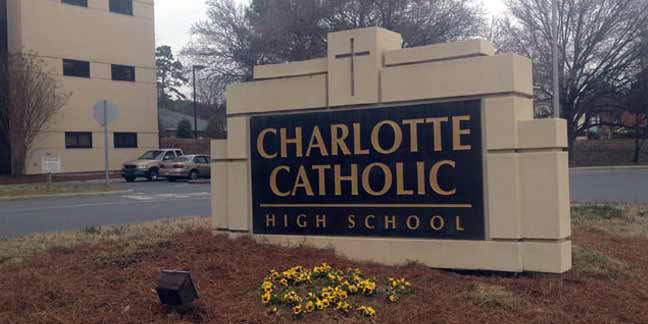 CHARLOTTE — The Diocese of Charlotte received broad support Thursday in its legal case to protect the freedom of Catholic schools to employ teachers who uphold Church teaching.
CHARLOTTE — The Diocese of Charlotte received broad support Thursday in its legal case to protect the freedom of Catholic schools to employ teachers who uphold Church teaching.
More than 40 religious denominations, civil rights groups, legal scholars, faith groups and educational organizations filed friend-of-the-court briefs Sept. 29 in support of the diocese, agreeing that the diocese should remain free to ask its teachers to uphold the Catholic faith in word and deed. The support underscores how important the case is for religious and civil rights organizations nationally, the diocese said.
Currently under consideration in the Fourth Circuit Court of Appeals, the case dates back to 2017, when the American Civil Liberties Union sued Charlotte Catholic High School on behalf of retired drama teacher Lonnie Billard after the school removed him from its list of substitute teachers. The school asks all of its teachers to uphold and model the Catholic faith. Billard entered a same-sex marriage and posted about it on Facebook, where he was friends with parents of current and former students. A federal court in 2021 ruled in Billard’s favor, and the diocese appealed.
In its appeal, the diocese argues that the U.S. Constitution and federal law protect the freedom of religious schools to choose teachers who support and uphold their religious beliefs.
The diocese is being represented by the Becket Fund for Religious Liberty, a non-profit law firm based in Washington, D.C., which has an undefeated record in the U.S. Supreme Court and is assisting free of charge.
“The Supreme Court has repeatedly protected the right of religious schools to choose who will teach and model the faith for the next generation,” said Luke Goodrich, the Becket Fund’s vice president and senior counsel. “If ‘separation of church and state’ means anything, it means the state doesn’t get to dictate the inner workings of Catholic schools.”
The friend-of-the-court briefs filed Sept. 29 include support from a broad range of Christian and non-Christian faiths, including: the Church of Jesus Christ of Latter-Day Saints, the Southern Baptist Convention, the Seventh-day Adventist Conference and the Lutheran Church-Missouri Synod, as well as the Jewish Coalition for Religious Liberty and the Islam and Religious Freedom Action Team of the Religious Freedom Institute (brief).
Support also comes from numerous other religious groups (brief), educational organizations (brief), prominent legal scholars (brief), the Christian Legal Society (brief), the Cardinal Newman Society (brief), and civil rights groups including the Institute for Free Speech (brief).
“Religious liberty means the right to be different, individually and institutionally,” the brief filed jointly by seven legal scholars said. “This freedom can exist only if religious institutions are free to create learning environments where their beliefs, principles of morality, and way of life are passed on through both instruction and personal example.”
The briefs explain how the freedom to hire faithful employees is protected by federal employment law, civil rights laws such as the Religious Freedom Restoration Act, and the U.S. Constitution.
“This remarkable show of support demonstrates that this case is not just about the freedom of one school to teach the Catholic faith, but about the freedom of all people of faith to form communities around shared religious beliefs and practices,” Goodrich said.
Billard and the ACLU argue that his termination is a form of sex discrimination.
The diocese asserts that hiring faculty who fully embrace Catholic values is essential to passing on the faith to future generations. Parents make immense sacrifices to send their children to Catholic schools, the diocese says, and they expect the diocese to ensure its schools provide an authentic Catholic education.
The diocese also notes that Billard, like all teachers, signed an annual employment contract agreeing to uphold the teachings of the Catholic Church. Billard was married to his wife of more than 20 years during his initial tenure at Charlotte Catholic High School.
Several other Catholic schools recently prevailed in similar high-profile cases. Earlier this year, a federal appeals court in Illinois and the Indiana Supreme Court both threw out lawsuits from former Catholic educators who lost their jobs after entering same-sex unions in violation of their contracts and Church teaching. On Sept. 30, a federal district court in Indiana ruled in favor of the school in another similar case.
The Vatican’s Congregation for Catholic Education in Rome also recently released guidance on the identity of Catholic schools, emphasizing that “teachers must be outstanding in correct doctrine and integrity of life” and “have the obligation to recognize and respect the Catholic character of the school from the moment of their employment.”
The ACLU is expected to respond to the diocese’s appeal in November, and a decision from the court is expected in 2023.
— Catholic News Herald


